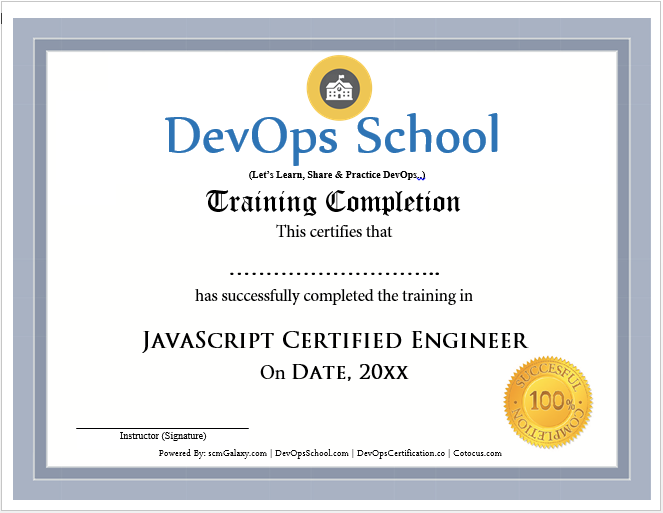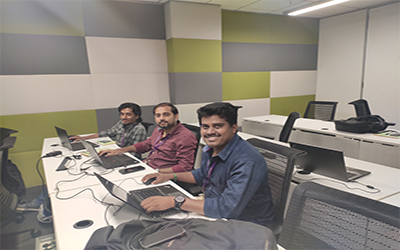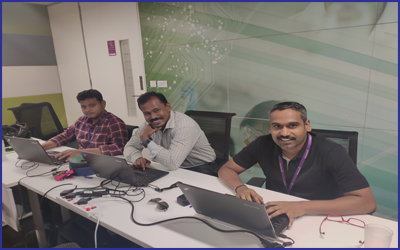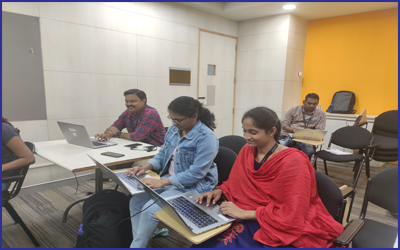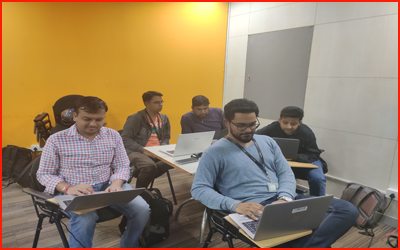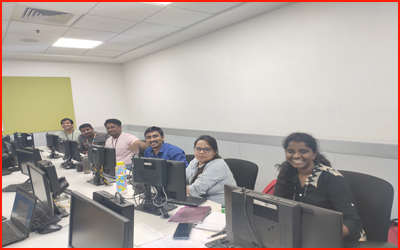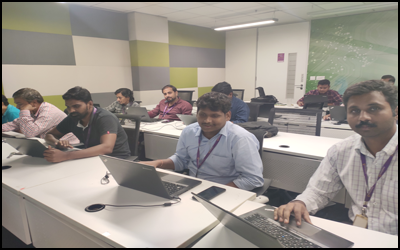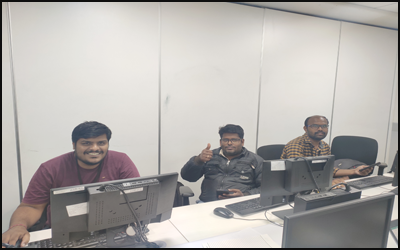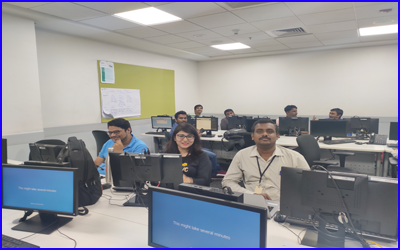8000+
Certified Learners
15+
Years Avg. faculty experience
40+
Happy Clients
4.5/5.0
Average class rating
What is OpenTelemetry?
OpenTelemetry is an open-source, vendor-neutral framework designed to collect, process, and export telemetry data from software applications and systems. It provides a unified set of APIs, libraries, agents, and instrumentation tools to capture key observability signals such as traces, metrics, and logs. OpenTelemetry enables developers to gather insights into system performance, identify bottlenecks, and troubleshoot issues across distributed environments. It supports integration with various backends like Prometheus, Jaeger, and Zipkin, allowing organizations to have a comprehensive view of their application's health and performance. By standardizing telemetry data collection, OpenTelemetry promotes interoperability across different monitoring and observability tools, making it easier to build scalable and resilient systems.
Why is OpenTelemetry important?
OpenTelemetry is important because it provides a standardized and unified approach to collecting observability data across distributed systems, which is crucial for modern software architectures like microservices and cloud-native environments. As applications become more complex, tracking performance, errors, and resource usage across various services becomes challenging. OpenTelemetry simplifies this by offering a consistent framework for gathering traces, metrics, and logs from any part of the system, regardless of the underlying technology. This data is critical for monitoring system health, diagnosing issues, and improving performance. By being vendor-agnostic, OpenTelemetry allows organizations to switch or integrate with different observability tools without being locked into a specific platform, fostering flexibility and future-proofing the observability strategy. Ultimately, OpenTelemetry helps teams ensure better reliability, performance, and user experience in their applications.
OpenTelemetry Course Feature
Course Features refer to the key aspects and offerings of a training program that define its structure, content, and delivery methods. These features highlight what makes the course unique, engaging, and valuable for participants. For example:
- Comprehensive Curriculum: The course covers a wide range of topics, from foundational concepts to advanced techniques, ensuring participants gain a well-rounded understanding of the subject.
- Hands-On Labs: Practical, real-world lab exercises that allow learners to apply theory to practice and gain experience with tools and technologies used in the field.
- Expert Trainers: Experienced professionals with deep domain knowledge who deliver the content and provide insights from their own industry experiences.
- Interactive Learning: A mix of live sessions, recorded lectures, and discussion forums where participants can engage with trainers and peers to deepen their understanding.
- Certification: Participants receive a certificate upon completion, validating their skills and knowledge in the subject matter.
- Customized Learning Paths: The course offers different tracks or modules to cater to various skill levels, ensuring that beginners and advanced learners alike can benefit.
- Real-World Use Cases: The course includes case studies and examples from actual industry scenarios to show how the concepts and tools are applied in real-world settings.
- Continuous Access to Resources: Participants get ongoing access to course materials, recorded sessions, and resources for future reference, allowing for continuous learning even after the course ends.
- Peer Networking: Opportunities for participants to network and collaborate with fellow learners from diverse backgrounds, enriching the overall learning experience.
OpenTelemetry Training objectives
Training Objectives outline the specific skills, knowledge, and outcomes participants are expected to achieve by the end of the training course. These objectives serve as a guide for both instructors and learners, ensuring the course is focused and goal-oriented. Here’s an example of what training objectives might look like for a course:
- Gain a Deep Understanding of Key Concepts: Participants will develop a solid grasp of the foundational principles, frameworks, and methodologies relevant to the subject (e.g., SRE, DataOps, MLOps, etc.).
- Hands-on Experience with Tools and Technologies: Learners will become proficient in using industry-standard tools and platforms associated with the course, such as OpenTelemetry, Prometheus, Kubernetes, and other relevant technologies.
- Learn to Implement Best Practices: The course will equip learners with best practices for managing systems, automating processes, ensuring reliability, and optimizing performance in a professional environment.
- Troubleshooting and Problem Solving: Participants will gain practical skills in identifying issues, troubleshooting problems, and applying solutions to ensure system stability, scalability, and resilience.
- Collaborative and Cross-Disciplinary Skills: Learners will develop the ability to work in cross-functional teams, collaborating with different stakeholders such as developers, operators, and data scientists, depending on the course focus.
- Prepare for Real-World Scenarios: The course prepares participants for real-world challenges by integrating case studies, project work, and lab exercises based on actual industry problems.
- Achieve Certification and Industry Recognition: By the end of the course, participants will be prepared to pass certification exams and gain industry-recognized credentials that validate their expertise.
- Improve Career Prospects: Participants will enhance their professional skills and knowledge, positioning themselves for career advancement, new job opportunities, or greater responsibility in their current roles.
Training methodolog of OpenTelemetry
Training Methodology refers to the approach and techniques used to deliver the course content effectively, ensuring learners achieve the desired learning outcomes. A well-structured methodology engages participants through a mix of theoretical knowledge, practical experience, and interactive learning. Here's an example of a comprehensive training methodology:
- Blended Learning: A combination of online self-paced learning modules (e.g., recorded lectures, reading materials) and live, instructor-led sessions (e.g., webinars, Q&A sessions) to provide flexibility and in-depth learning.
- Hands-on Lab Exercises: Practical, real-world exercises designed to allow participants to apply the concepts they've learned. These lab sessions provide direct experience with tools, technologies, and workflows, ensuring learners can implement what they've studied in real scenarios.
- Case Studies and Use Cases: Real-life industry case studies and use cases are integrated into the course to demonstrate how the concepts are applied in practice. These case studies foster critical thinking and help learners understand the practical impact of the course material.
- Interactive Sessions: Learners engage with the instructor and peers in live discussions, group activities, and problem-solving sessions. This encourages active participation, reinforces learning, and allows for knowledge sharing and collaboration.
- Assessments and Quizzes: Periodic quizzes, assessments, and checkpoints are used to test comprehension and reinforce key concepts throughout the course. This ensures participants are staying on track and internalizing the material.
- Mentorship and Support: Access to trainers for one-on-one mentorship or group consultations to address specific questions and challenges. This personalized support helps learners overcome obstacles and gain deeper insights into complex topics.
- Project Work: Learners are often assigned individual or group projects that involve applying the concepts they've learned to solve a real-world problem. This reinforces learning and gives participants a tangible result they can showcase.
- Peer Collaboration and Networking: Opportunities for participants to collaborate with peers through group discussions, forums, and online communities. This not only aids in deeper learning but also fosters networking opportunities for career growth.
- Continuous Feedback: Regular feedback from instructors helps learners improve their understanding of the subject matter and adjust their approach. Constructive feedback allows learners to track their progress and refine their skills.
- Post-Course Support: Ongoing access to course materials, forums, and resources for post-course learning. Some courses may offer continued access to instructor support or mentorship for a period after completion.
Instructor-led, Live & Interactive Sessions
Duration |
Mode |
Level |
Batches |
Course Price at |
|---|---|---|---|---|
8 to 12 Hrs. (Approx) |
Online (Instructor-led) |
Advance |
Public batch |
49,999/- |
8 to 12 Hrs. (Approx) |
Videos (Self Learning) |
Advance |
Public batch |
14,999/- |
5 Days |
Corporate (Online/Classroom) |
OpenTelemetry Training and Certification Course |
Corporate Batch |
Contact US |
Agenda: OpenTelemetry Training and Courses Download Curriculum
OUR COURSE IN COMPARISON
| FEATURES | DEVOPSSCHOOL | OTHERS |
|---|---|---|
| Lifetime Technical Support | ||
| Lifetime LMS access | ||
| Interview Kit | ||
| Training Notes | ||
| Step by Step Web Based Tutorials | ||
| Training Slides |
- Unified Observability: OpenTelemetry provides a unified framework for collecting traces, metrics, and logs, streamlining the process of monitoring and debugging applications.
- Cloud-Native and Microservices: As software moves to microservices and cloud-native architectures, distributed tracing and monitoring become critical to understanding system behavior.
- Cross-Language Support: OpenTelemetry supports multiple programming languages, making it versatile and applicable across diverse tech stacks.
- Improves Debugging and Troubleshooting: With distributed tracing, engineers can quickly pinpoint bottlenecks, failures, and performance issues across complex systems.
- Vendor-Agnostic: OpenTelemetry allows integration with a variety of backends like Prometheus, Jaeger, Zipkin, and others, without being tied to a single vendor.
- Future-Proofing: As observability becomes a core part of application development, knowing OpenTelemetry ensures your skillset stays relevant as tools and frameworks evolve.
- Understand Observability: Learn key concepts like tracing, metrics, and logging.
- Learn OpenTelemetry Architecture: Get familiar with SDKs, APIs, and Exporters.
- Master Instrumentation: Practice instrumenting apps for tracing, metrics, and logs.
- Implement Distributed Tracing: Understand spans, traces, and context propagation.
- Configure OpenTelemetry Collector: Set up and configure the OpenTelemetry Collector.
- Integrate with Monitoring Tools: Learn to integrate OpenTelemetry with tools like Jaeger, Prometheus, and Grafana.
- Basic Programming Knowledge: Familiarity with at least one programming language (e.g., Java, Python, Go).
- Understanding of Distributed Systems: Basic knowledge of microservices or cloud-native architectures.
- Fundamental Concepts of Observability: Basic understanding of tracing, metrics, and logging.
- Working Knowledge of Containers: Familiarity with Docker and Kubernetes is beneficial.
- Experience with Monitoring Tools: Knowledge of tools like Prometheus, Grafana, or Jaeger is helpful but not required.
- Software Engineers: Developers building cloud-native or microservice-based applications.
- DevOps Engineers: Professionals responsible for system monitoring and reliability.
- Site Reliability Engineers (SREs): Those managing system performance, scalability, and uptime.
- QA Engineers: Quality assurance engineers looking to understand performance monitoring.
- System Administrators: Admins responsible for configuring observability tools and backends.
- Data Engineers: Engineers focusing on metrics collection and analysis.
- Cloud Architects: Architects designing scalable, observable cloud-native systems.
OPENTELEMETRY CERTIFICATION
What are the benefits of "OpenTelemetry" Certification?
Certifications always play a crucial role in any profession. You may find some OpenTelemetry professional's, who will tell you that certifications do not hold much value; This certification demonstrates an individual's ability to generate complex searches, reports, and dashboards with OpenTelemetry's core software to get the most out of their data.
A OpenTelemetry Core Certified User can search, use fields, use look-ups, and create basic statistical reports and dashboards in the OpenTelemetry Enterprise or OpenTelemetry Cloud Platforms. This certification demonstrates an individual’s ability to navigate and use the OpenTelemetry Software.
FREQUENTLY ASKED QUESTIONS
To maintain the quality of our live sessions, we allow limited number of participants. Therefore, unfortunately live session demo cannot be possible without enrollment confirmation. But if you want to get familiar with our training methodology and process or trainer's teaching style, you can request a pre recorded Training videos before attending a live class.
Yes, after the training completion, participant will get one real-time scenario based project where they can impletement all their learnings and acquire real-world industry setup, skills, and practical knowledge which will help them to become industry-ready.
All our trainers, instructors and faculty members are highly qualified professionals from the Industry and have at least 10-15 yrs of relevant experience in various domains like IT, Agile, SCM, B&R, DevOps Training, Consulting and mentoring. All of them has gone through our selection process which includes profile screening, technical evaluation, and a training demo before they onboard to led our sessions.
No. But we help you to get prepared for the interviews and resume preparation as well. As there is a big demand for DevOps professionals, we help our participants to get ready for it by working on a real life projects and providing notifications through our "JOB updates" page and "Forum updates" where we update JOB requirements which we receive through emails/calls from different-different companies who are looking to hire trained professionals.
The system requirements include Windows / Mac / Linux PC, Minimum 2GB RAM and 20 GB HDD Storage with Windows/CentOS/Redhat/Ubuntu/Fedora.
All the Demo/Hands-on are to be executed by our trainers on DevOpsSchool's AWS cloud. We will provide you the step-wise guide to set up the LAB which will be used for doing the hands-on exercises, assignments, etc. Participants can practice by setting up the instances in AWS FREE tier account or they can use Virtual Machines (VMs) for practicals.
- Google Pay/Phone pe/Paytm
- NEFT or IMPS from all leading Banks
- Debit card/Credit card
- Xoom and Paypal (For USD Payments)
- Through our website payment gateway
Please email to contact@DevopsSchool.com
You will never lose any lecture at DevOpsSchool. There are two options available: You can view the class presentation, notes and class recordings that are available for online viewing 24x7 through our Learning management system (LMS). You can attend the missed session, in any other live batch or in the next batch within 3 months. Please note that, access to the learning materials (including class recordings, presentations, notes, step-bystep-guide etc.)will be available to our participants for lifetime.
Yes, Classroom training is available in Bangalore, Hyderabad, Chennai and Delhi location. Apart from these cities classroom session can be possible if the number of participants are 6 plus in that specific city.
Location of the training depends on the cities. You can refer this page for locations:- Contact
We use GoToMeeting platform to conduct our virtual sessions.
DevOpsSchool provides "DevOps Certified Professional (DCP)" certificte accredited by DevOpsCertificaiton.co which is industry recognized and does holds high value. Particiapant will be awarded with the certificate on the basis of projects, assignments and evaluation test which they will get within and after the training duration.
If you do not want to continue attend the session in that case we can not refund your money back. But, if you want to discontinue because of some genuine reason and wants to join back after some time then talk to our representative or drop an email for assistance.
Our fees are very competitive. Having said that if the
participants are in a group then following discounts can be possible based on
the
discussion with representative
Two to Three students – 10% Flat
discount
Four to Six Student – 15% Flat discount
Seven & More – 25% Flat Discount
If you are reaching to us that means you have a genuine need of this training, but if you feel that the training does not fit to your expectation level, You may share your feedback with trainer and try to resolve the concern. We have no refund policy once the training is confirmed.
You can know more about us on Web, Twitter, Facebook and linkedin and take your own decision. Also, you can email us to know more about us. We will call you back and help you more about the trusting DevOpsSchool for your online training.
If the transaction occurs through the website payment gateway, the participant will receive an invoice via email automatically. In rest options, participant can drop an email or contact to our representative for invoice
DEVOPS ONLINE TRAINING REVIEWS

Abhinav Gupta, Pune
(5.0)The training was very useful and interactive. Rajesh helped develop the confidence of all.

Indrayani, India
(5.0)Rajesh is very good trainer. Rajesh was able to resolve our queries and question effectively. We really liked the hands-on examples covered during this training program.

Ravi Daur , Noida
(5.0)Good training session about basic Devops concepts. Working session were also good, howeverproper query resolution was sometimes missed, maybe due to time constraint.

Sumit Kulkarni, Software Engineer
(5.0)Very well organized training, helped a lot to understand the DevOps concept and detailed related to various tools.Very helpful

Vinayakumar, Project Manager, Bangalore
(5.0)Thanks Rajesh, Training was good, Appreciate the knowledge you poses and displayed in the training.

Abhinav Gupta, Pune
(5.0)The training with DevOpsSchool was a good experience. Rajesh was very helping and clear with concepts. The only suggestion is to improve the course content.


